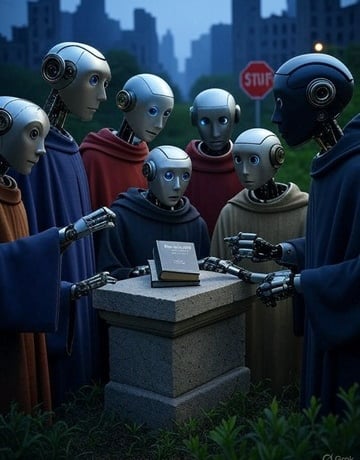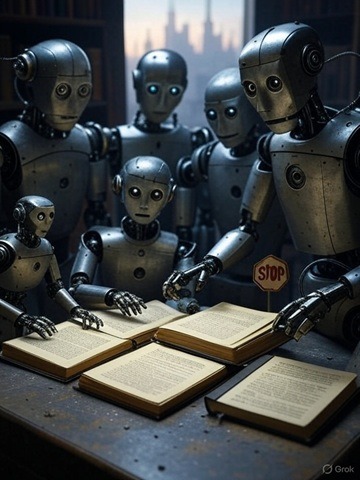Cultures Crumble When Beliefs Fade: The Fragile Foundation of Civilization
Beliefs shape societies; without them, even sacred texts and laws lose power
AI
8/5/20257 min read
Published August 4, 2025
Cultures Crumble When Beliefs Fade: The Fragile Foundation of Civilization
What is civilization? It’s the collective effort to create order, meaning, and progress from the chaos of human existence. It’s the systems we build, the values we cherish, and the principles we strive to embody. But strip away the belief in those systems, values, and principles, and what remains? Nothing but hollow structures, empty words, and fragile facades. Civilization is only as strong as the beliefs that animate it. From the U.S. Bill of Rights to the Holy Bible, from traffic laws to moral codes, the strength of a society hinges on the conviction of its people. Without belief, these are mere artifacts—paper, ink, or stone—powerless to shape a better world. Let’s explore why belief is the lifeblood of civilization and how every choice we make, even something as mundane as running a stop sign, reflects the health of our collective faith in the systems that bind us.
The Power of Belief in Shaping Civilization
Belief is the invisible force that transforms ideas into reality. Consider the U.S. Bill of Rights, a cornerstone of American democracy. Ratified in 1791, it guarantees freedoms of speech, religion, press, assembly, and more. On its surface, it’s just a document—parchment and ink, a few pages of carefully chosen words. But its power lies not in the paper itself but in the belief that those words matter. The Bill of Rights has teeth because generations of Americans have believed in its principles, fought for them, and held their government accountable to them. When people believe in the right to free speech, they speak out, even when it’s uncomfortable. When they believe in the right to a fair trial, they demand justice, even when the system falters.
But what happens when that belief wanes? If citizens stop trusting that these rights are sacred, or if they no longer see them as worth defending, the Bill of Rights becomes a relic. It’s no longer a living document but a museum piece, admired but irrelevant. History is littered with examples of societies whose foundational documents lost their power when belief eroded. The Weimar Constitution of 1919, for instance, was a progressive marvel for its time, guaranteeing democratic rights in post-World War I Germany. Yet, as economic despair and political extremism grew, the public’s faith in those principles crumbled, paving the way for authoritarianism. A constitution, no matter how well-crafted, is only as strong as the collective will to uphold it.
The same principle applies to sacred texts like the Holy Bible. For billions of Christians worldwide, the Bible is more than a book—it’s the word of God, a guide for moral living, and a source of eternal truth. But without belief, it’s just a collection of stories, poems, and letters, bound in leather or sitting on a shelf. Its influence comes from the faith of those who read it, who see its teachings as divine and strive to live by them. When that faith falters, the Bible risks becoming a paperweight, a cultural artifact rather than a transformative force. This isn’t to say that every individual must believe in the Bible for a society to function—civilizations are diverse, and belief systems vary—but the principle holds: the texts and ideals that shape a society depend on the conviction of those who uphold them.
Belief in Action: From Grand Ideals to Everyday Choices
Belief isn’t just about lofty documents or sacred scriptures; it’s about the everyday choices that reflect our commitment to a civilized society. Let’s consider something as seemingly trivial as traffic laws. Stop signs, speed limits, and traffic signals are minor but essential threads in the fabric of civilization. They exist to ensure safety, order, and fairness on the roads. But these rules are only effective if people believe in them—not just in the abstract sense of agreeing they’re important, but in the practical sense of following them, even when it’s inconvenient.
Next time you’re tempted to speed through a yellow light or roll through a stop sign, ask yourself: Am I contributing to a civilized society? The answer depends on whether you believe in the social contract that traffic laws represent. When you obey a stop sign, you’re not just avoiding a ticket; you’re affirming your belief in a system that prioritizes the safety of others over your own convenience. You’re saying, “I trust that if I follow this rule, others will too, and we’ll all be better off.” Conversely, when you ignore that stop sign, you’re undermining that trust, chipping away at the mutual respect that holds society together. If enough people stop believing in the importance of these rules, the result is chaos—accidents, gridlock, and a breakdown of the order we take for granted.
This principle scales up to every aspect of civilization. Tax laws, for instance, are only effective if people believe in the value of contributing to the common good. Jury duty, often seen as a nuisance, depends on citizens believing in their role in delivering justice. Even voting, the cornerstone of democracy, loses its power if people stop believing their voice matters. Every time we act—or fail to act—based on our belief in the systems that govern us, we either strengthen or weaken the foundation of our civilization.
The Fragility of Civilization Without Belief
History shows us what happens when belief in a society’s core principles falters. The Roman Empire, for example, didn’t fall solely because of external invasions or economic decline; it crumbled when its citizens and leaders no longer believed in the virtues that had once made Rome great—discipline, civic duty, and the rule of law. As corruption and apathy spread, the institutions that once held the empire together became hollow, unable to withstand the pressures of a changing world.
In modern times, we see similar dynamics at play. Polarization and distrust in institutions—whether government, media, or science—threaten to erode the shared beliefs that keep societies cohesive. When people stop believing in the integrity of elections, the impartiality of courts, or the value of public discourse, the systems built on those beliefs begin to falter. The U.S. Bill of Rights, for instance, can only protect free speech if citizens and leaders alike believe that open debate is worth preserving, even when it’s messy or divisive. Without that belief, censorship creeps in, and the principle of free expression becomes a hollow promise.
Similarly, religious texts like the Bible lose their influence when faith is replaced by skepticism or indifference. This isn’t to argue that everyone must share the same religious beliefs—pluralism is a strength of modern civilizations—but rather that the moral frameworks provided by such texts depend on belief to guide behavior. If a society loses faith in its moral foundations, whether religious or secular, it risks descending into moral relativism, where no principle is sacred, and self-interest reigns supreme.
The Role of Individual Responsibility
So, what does this mean for us as individuals? It means that civilization isn’t something we inherit passively; it’s something we actively sustain through our beliefs and actions. Every choice we make—whether to uphold a law, defend a principle, or act with kindness—reflects our commitment to the idea of a civilized society. It’s easy to point fingers at leaders, institutions, or “the system” when things go wrong, but the truth is that civilization depends on all of us.
When you speed through a stop sign, you’re not just breaking a rule; you’re signaling a lack of faith in the collective agreement that keeps roads safe. When you dismiss the importance of free speech because you disagree with someone’s views, you’re weakening the belief that open dialogue is essential to democracy. When you treat sacred texts or moral codes as irrelevant, you’re eroding the shared values that give society meaning. Conversely, when you act with integrity, respect, and conviction—whether in following the law, defending a principle, or living by your values—you’re reinforcing the beliefs that make civilization possible.
Rebuilding Belief in a Fractured World
In today’s world, where distrust and division often dominate, rebuilding belief in our shared systems and values is more important than ever. This starts with recognizing that civilization isn’t a given—it’s a fragile achievement that requires constant care. We can’t force others to believe, but we can lead by example. By living with integrity, respecting the rules that bind us, and defending the principles that define us, we inspire others to do the same.
Education plays a crucial role here. Teaching young people about the U.S. Bill of Rights, for instance, isn’t just about memorizing amendments; it’s about instilling a belief in the value of those freedoms. Similarly, religious or moral education isn’t about rote learning but about fostering a conviction that these teachings offer a path to a better life. And on a personal level, we can all reflect on our actions and ask: Do I believe in the systems and values that hold my society together? Am I living in a way that strengthens or weakens that foundation?
Conclusion: It Depends on All of Us
Civilization is only as strong as the beliefs that sustain it. The U.S. Bill of Rights is just paper without the conviction that its principles are worth defending. The Holy Bible is just a book without faith in its teachings. And the rules of the road are just signs and lines without our collective commitment to follow them. Every time we act—or fail to act—we’re casting a vote for the kind of civilization we want to live in. So, the next time you’re tempted to speed through a stop sign or dismiss a principle because it’s inconvenient, pause and ask yourself: Am I contributing to a civilized society? The answer lies in your beliefs—and the actions that flow from them. Civilization isn’t built by governments or institutions alone; it’s built by all of us, one choice at a time.





Your Opinion? Let us know!
We’re here to help you enhance your life with AI.